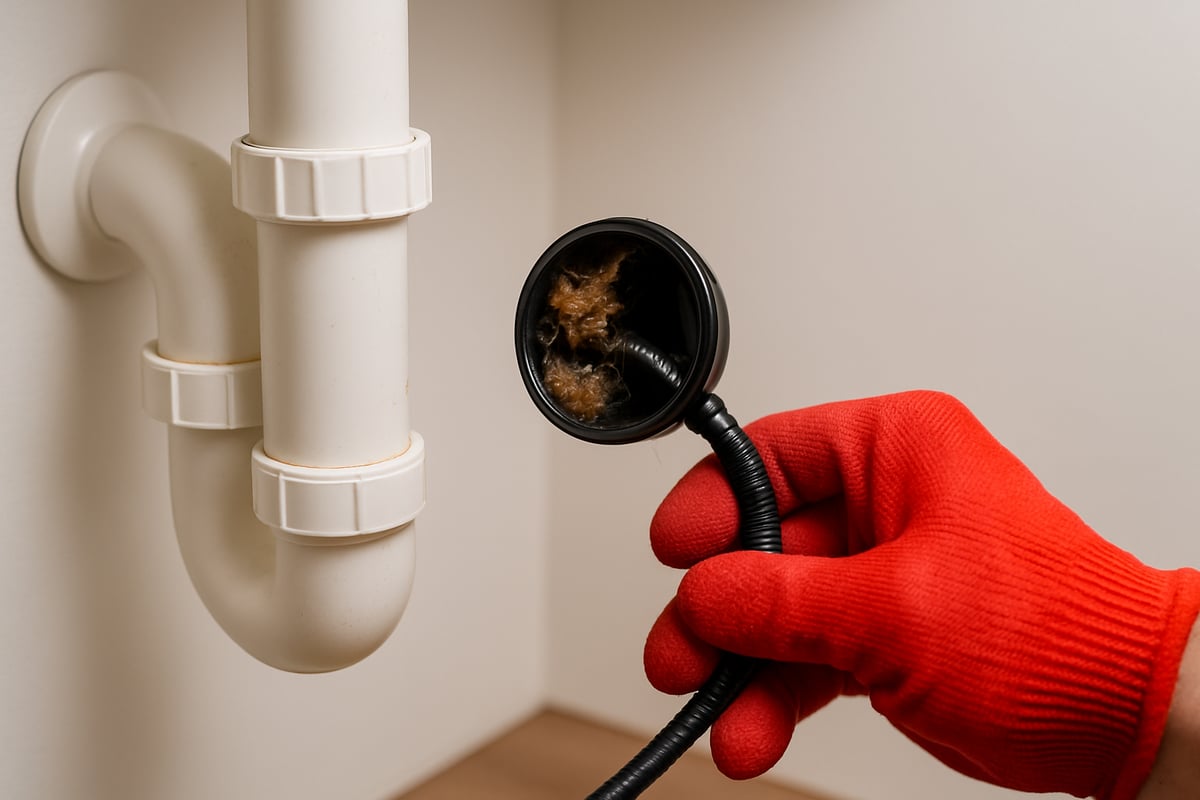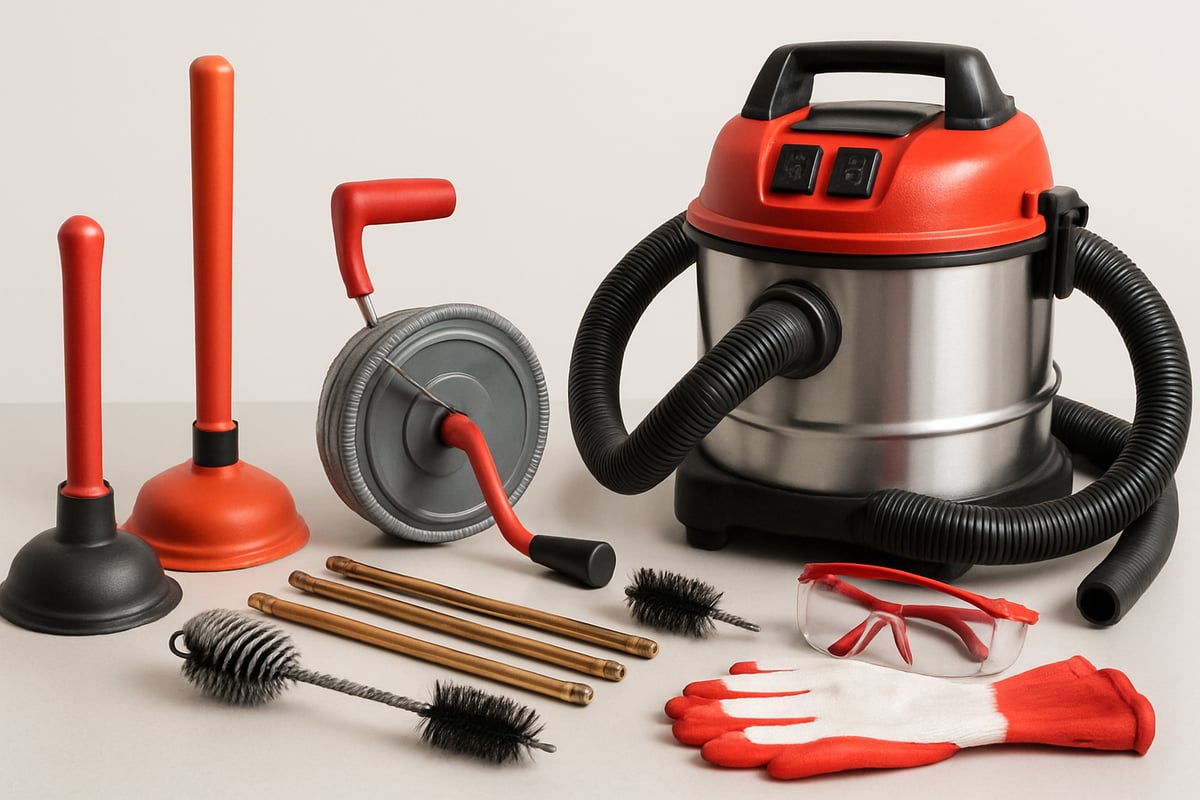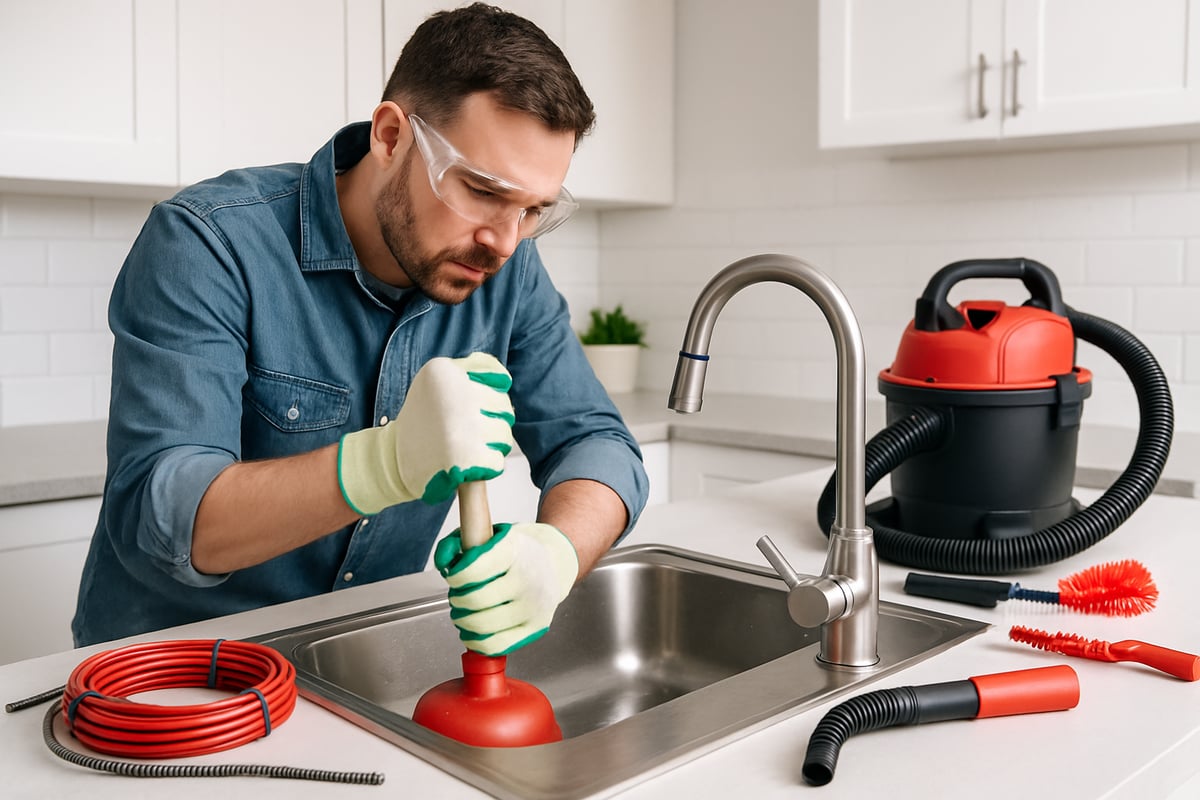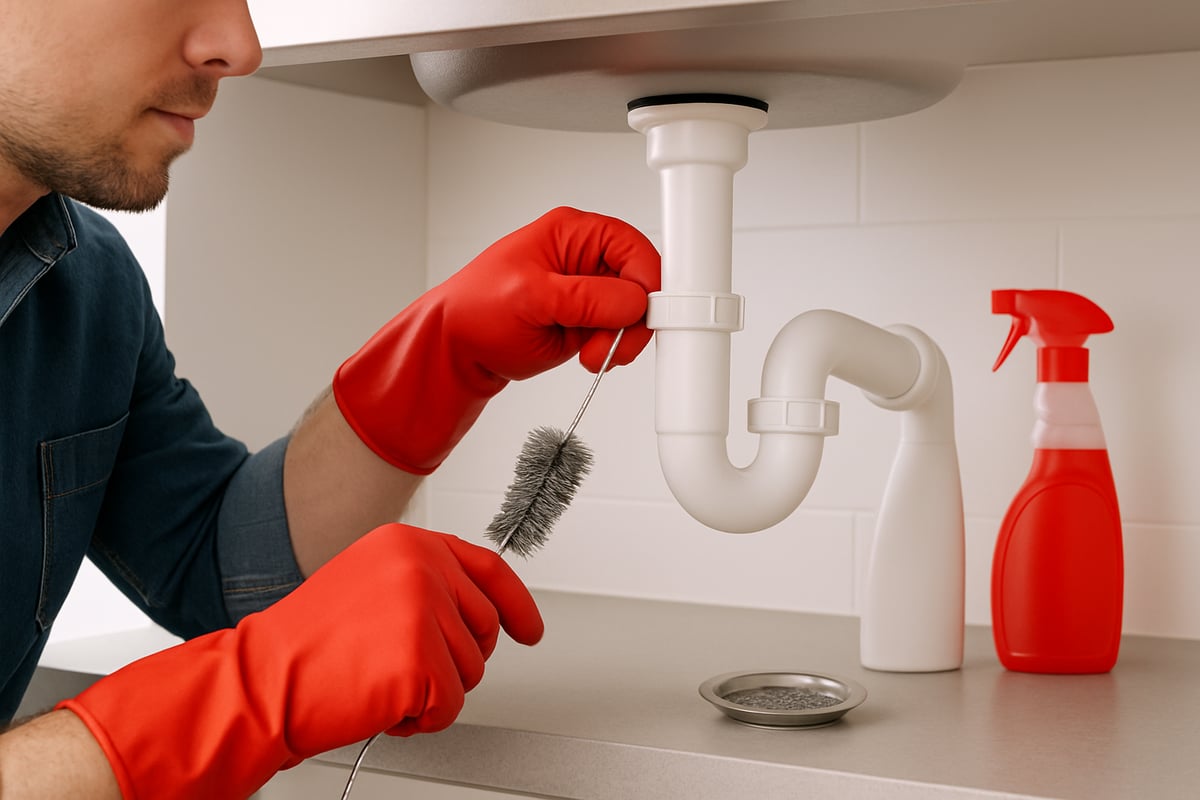Expert Guide to Unblock Waste Pipe Effectively in 2025
A blocked waste pipe can quickly turn a minor inconvenience into a costly disaster, especially if left unchecked in 2025.
This expert guide is designed to help you unblock waste pipe issues efficiently, prevent recurring blockages, and keep your plumbing running smoothly all year round.
You'll discover the main causes and early warning signs, essential tools and safety tips, step-by-step unblocking methods, prevention strategies, when to call a professional, and what costs to expect.
Take action now with practical solutions and keep your home or property protected from drainage headaches.
Understanding Waste Pipe Blockages: Causes and Early Warning Signs
Blocked waste pipes are a common headache for households, but understanding what causes them and recognising the early signs can make all the difference. Knowing how and why issues develop helps you act before a minor problem turns into a major one, saving you time, money, and stress as you work to unblock waste pipe systems efficiently.

Common Causes of Waste Pipe Blockages
Several everyday habits and environmental factors contribute to blockages in waste pipes. The most frequent offenders include:
- Grease, fats, and food debris: Pouring cooking oil or fat down the sink leads to sticky build-up that traps other particles.
- Bathroom waste: Hair, soap scum, and toiletries easily collect in bathroom pipes, creating stubborn obstructions.
- Foreign objects: Items accidentally flushed or washed down drains, such as wipes, cotton buds, and small toys, can quickly block pipes.
- Mineral scale: In hard water areas, limescale and mineral deposits gradually narrow pipe interiors.
- Structural issues: Misaligned or collapsed pipes, as well as invasive tree roots, can physically obstruct flow and make it harder to unblock waste pipe problems.
According to the UK Drainage Habits Survey 2025, up to 80% of domestic blockages result from improper disposal of fats and non-flushable items. Imagine a household that regularly pours leftover oil down the kitchen sink, only to discover slow drainage and a foul smell weeks later.
Recognising these causes is the first step to prevent and unblock waste pipe issues effectively.
Early Warning Signs of a Blocked Waste Pipe
Spotting the warning signs early is crucial if you want to avoid a full-blown blockage. Here are some common indicators:
- Gurgling noises: Unusual sounds from sinks, baths, or toilets suggest trapped air or partial blockages.
- Slow draining water: Water that lingers or stands in sinks and showers often points to a developing clog.
- Bad odours: Persistent unpleasant smells coming from drains are a classic sign of waste build-up.
- Water backing up: Appliances like washing machines or dishwashers may overflow or drain poorly if waste pipes are blocked.
- Overflowing drains: External drains or inspection chambers with visible overflow indicate a more serious problem.
If you notice any of these signs, taking swift action to unblock waste pipe systems can prevent expensive repairs. For example, a homeowner who detects a persistent kitchen odour might act quickly, clearing a partial blockage before water damage occurs.
Addressing these early signs keeps your plumbing in good working order and helps you avoid emergencies linked to blocked pipes.
Essential Tools, Equipment, and Safety Precautions
Having the right tools and knowing how to use them safely makes all the difference when you need to unblock waste pipe systems around your home. With the correct equipment, you can tackle most minor blockages yourself, saving time and money.

Must-Have Tools for Unblocking Waste Pipes
If you want to unblock waste pipe blockages effectively, you will need a few essential tools. Each one plays a specific role in removing obstructions from pipes and drains.
- Plunger (cup and flange types): Great for sinks, baths, and toilets. The cup type works well on flat surfaces, while the flange plunger is ideal for toilets.
- Drain auger (manual or powered): This flexible tool reaches deeper into pipes to dislodge stubborn clogs. Manual versions are perfect for household use.
- Drain rods: Used mainly for external pipes and longer runs, these rods connect together to clear blockages in outdoor drains.
- Wet/dry vacuum: Ideal for removing water or sucking out debris from blocked pipes.
- Pipe cleaning brushes: These help scrub away build-up inside pipe bends and traps.
- Chemical or natural drain cleaners: Useful for dissolving organic matter, but always use them cautiously.
- Protective gear: Gloves, goggles, and masks are essential to protect yourself from splashes and harmful substances.
For particularly stubborn blockages or a thorough clean, you might consider powerflushing and pipe cleaning as an advanced solution, especially when standard tools are not enough.
Safety Precautions and Best Practices
Safety should always be your top priority when you unblock waste pipe systems. Start by wearing protective gloves and safety glasses to shield your skin and eyes from chemicals or contaminated water.
Work in a well-ventilated area, especially if you are using cleaning agents. Always keep children and pets away from the workspace to avoid accidents. If you need to use chemical drain cleaners, never mix different products, as this can cause dangerous reactions.
Turn off the water supply to the affected area if you expect water to spill. Use the plunger with a steady, controlled motion to avoid splashing dirty water. When using a drain auger or rods, follow the instructions carefully, and never force the tool if it gets stuck.
For example, when you unblock waste pipe with a plunger, ensure a tight seal around the drain and use slow, deliberate pumps. This method reduces the risk of water splashing back. After finishing, always clean and disinfect your tools and the surrounding area.
Remember, following these safety measures every time you unblock waste pipe will keep you and your home safe while ensuring effective results.
Step-by-Step Guide: How to Unblock a Waste Pipe Effectively in 2025
Facing a blocked drain can be daunting, but with the right approach you can often resolve the issue yourself. This step-by-step guide will help you unblock waste pipe problems efficiently, keep your plumbing healthy, and know when to call in the experts.

Step 1: Assess the Blockage Location and Severity
The first step when you need to unblock waste pipe issues is to determine exactly where and how severe the problem is. Start by checking which fixtures are affected. Is it just one sink, or are multiple drains in your property slow or backing up?
If you notice water coming up in both your kitchen and bathroom, this often points to a main pipe blockage rather than a local issue. Head outside and check any inspection chambers or external drains for standing water or overflow, as this can indicate the obstruction is further down the system.
Listen for gurgling sounds and look for slow draining across several fixtures. These are classic warning signs that you need to act quickly to unblock waste pipe troubles before they escalate. For example, if water backs up in both your kitchen sink and shower, you've likely got a deeper, more complex blockage.
A careful assessment at this stage prevents wasted effort and helps you target your solution effectively.
Step 2: Manual Unblocking Methods
Once you've located the issue, try manual methods first to unblock waste pipe blockages. Begin with a plunger, using either a cup or flange type depending on the fixture. Create a tight seal and pump vigorously to dislodge the obstruction.
If the blockage is under a sink, place a bucket beneath the U-bend or trap. Unscrew the trap carefully and remove any debris like food, grease, or hair. Clean the trap thoroughly before reassembling it.
For stubborn clogs, use a drain snake or manual auger. Slowly feed it into the pipe and rotate to break up the blockage. If your washing machine or dishwasher is affected, disconnect the waste hose and flush it with hot water.
Here's a quick checklist for manual methods:
- Plunger for sinks, baths, and showers
- Remove and clean the U-bend/trap
- Use a drain snake or auger for deeper issues
- Flush disconnected appliance pipes with hot water
Regular use of these techniques can help you unblock waste pipe problems without resorting to harsh chemicals.
Step 3: Chemical and Natural Solutions
If manual efforts do not fully unblock waste pipe obstructions, consider chemical or natural solutions. Enzyme-based drain cleaners are effective and less harsh on your pipes. Always follow the manufacturer’s instructions and wear gloves and goggles for safety.
For a natural approach, pour half a cup of baking soda down the affected drain, followed by half a cup of vinegar. Wait for the fizzing to subside, then flush with hot water. This method works well for minor blockages, especially in kitchen sinks.
Avoid using strong chemical cleaners in old or plastic pipework, as they can cause damage. Never mix different products, as this can produce toxic fumes and make the situation worse.
Try these steps:
- Use enzyme-based or approved chemical cleaners as directed
- Apply a baking soda and vinegar flush for minor blockages
- Always prioritise safety and ventilation
These solutions are often enough to unblock waste pipe issues caused by everyday debris.
Step 4: Mechanical and Advanced Techniques
For more stubborn or deeper blockages, mechanical methods may be needed to unblock waste pipe problems. Drain rods are ideal for external pipes or long runs. Insert the rods gently into the pipe, twisting clockwise to push through obstructions. Avoid forcing them, as this can cause damage.
A wet/dry vacuum can be used to suck out blockages, especially in accessible pipes. Seal the vacuum hose over the drain opening and create a strong suction to dislodge the clog.
For severe cases, high-pressure water jetting is extremely effective. However, this equipment is best left to professionals due to the risk of injury and pipe damage.
Example scenario: If your garden gully is overflowing, carefully use drain rods to clear leaves and debris. Always wear protective gear throughout the process.
Mechanical methods provide a powerful way to unblock waste pipe obstructions that resist simpler solutions.
Step 5: Test and Reassemble
After using any technique to unblock waste pipe issues, it’s vital to check that the blockage is fully cleared. Run cold and hot water through the affected fixture for several minutes, observing the flow and checking for leaks.
If you dismantled traps or pipes, reassemble them carefully, ensuring all seals are tight. Double-check for any drips or water pooling beneath the sink or appliance.
Once everything is back in place, clean and disinfect the area thoroughly. This step helps prevent lingering odours and maintains a hygienic environment.
A quick checklist:
- Test water flow in all affected fixtures
- Reassemble pipes and traps, checking for leaks
- Clean and disinfect the area
Thorough testing ensures your efforts to unblock waste pipe problems are successful and lasting.
When to Seek Professional Help
Sometimes, despite your best efforts, you might not be able to unblock waste pipe issues yourself. Persistent or recurring blockages, foul odours, or sewage backing up in multiple areas are clear signs you need expert help.
If you suspect structural pipe damage, tree root intrusion, or if you simply can't locate the blockage, a professional plumber should be called. They have access to specialist tools like CCTV drain surveys, high-pressure water jetting, and advanced diagnostics.
Choosing a reputable drainage specialist ensures the job is done safely and in line with regulations. For those in need of expert support, you can explore Drainage services for waste pipes to find qualified professionals who can resolve complex blockages quickly.
Investing in professional help can save you time, prevent property damage, and keep your plumbing running smoothly.
Prevention Strategies: Keeping Waste Pipes Clear Year-Round
A proactive approach is the best way to unblock waste pipe issues before they start. By following simple habits and regular checks, you can keep your drainage system running smoothly all year round. Let’s explore how to prevent blockages and maintain clear waste pipes in your home.

Best Practices for Everyday Use
The easiest way to avoid having to unblock waste pipe systems is to be mindful of what goes down the drain. Small daily habits can make a big impact on pipe health.
- Never pour fats, oils, or coffee grounds down your sink. These substances solidify and stick to pipe walls, creating stubborn blockages.
- Use drain guards or strainers in sinks, baths, and showers to catch hair, food scraps, and other debris before they enter the pipes.
- Dispose of non-flushable items, such as wipes and sanitary products, in the bin, not the toilet or sink.
- Run hot water down kitchen drains after washing up to help flush away grease and soap residue.
Educate everyone in your household on these best practices. Consistent routines help ensure you rarely need to unblock waste pipe systems.
Routine Maintenance Tips
Routine care is essential for keeping your plumbing in top condition and reducing the likelihood you'll need to unblock waste pipe sections in the future.
- Inspect and clean U-bends or traps beneath sinks and basins every three to six months.
- Regularly flush your pipes with hot water or an enzyme-based cleaner to break down organic build-up.
- Schedule annual professional drain inspections, especially in older properties or those with a history of blockages.
- In hard water areas, consider installing a water softener to reduce mineral scale build-up inside pipes.
- Keep outdoor drains and gullies clear of leaves and debris, especially during autumn.
For more detailed advice on keeping your plumbing healthy, see these general plumbing maintenance tips.
By staying on top of maintenance, you can significantly reduce the need to unblock waste pipe systems unexpectedly.
Recognising and Addressing Minor Issues Early
Spotting small problems early can save you from bigger headaches and costly repairs down the line. If you notice slow drainage or unpleasant smells, act quickly.
- Address slow draining sinks or showers right away by cleaning the trap or using a plunger.
- Use baking soda and vinegar monthly in your kitchen sink as a natural preventative measure.
- Check for water pooling around external drains after heavy rain, which could indicate a developing blockage.
- Encourage everyone at home to report unusual noises or odours from any waste pipe.
Prompt action stops minor problems from turning into major ones. With vigilance and good habits, you’ll rarely need to unblock waste pipe systems, ensuring peace of mind and a smoothly running home.
Professional Drain Services: When and Why to Call an Expert
Even with the best intentions, some waste pipe blockages can prove too stubborn or risky for a DIY approach. Knowing when to call in a professional could save your property from serious damage and costly repairs. If you regularly need to unblock waste pipe issues, expert help may be the safest bet.
Benefits of Professional Drainage Services
Professional drainage specialists bring a wealth of experience and the right equipment to resolve the toughest blockages. If you attempt to unblock waste pipe and the issue keeps returning, a trained expert can offer a lasting solution.
Key benefits include:
- Access to advanced tools like CCTV drain surveys and high-pressure jetting.
- Accurate diagnosis of hidden or complex blockages, ensuring the real source of the problem is found.
- Safe removal of tree roots, hard scale, or collapsed pipes, which DIY efforts cannot address.
- Full compliance with local waste disposal regulations, so you avoid legal pitfalls.
For example, a main drain blockage affecting multiple flats often needs professional intervention. DIY methods may only provide temporary relief, while a specialist can completely unblock waste pipe systems using their expertise.
With improper disposal of items being a leading cause of blockages, as highlighted in Anglian Water's Unflushables Report, professional services can tackle issues at the source and help prevent repeat incidents.
If you are seeking local expertise, Plumbing services in Gravesend provide tailored solutions for complex drainage problems, offering peace of mind for property owners.
How to Choose a Qualified Drainage Specialist
Choosing the right professional is crucial if you want to unblock waste pipe quickly and safely. Here are some essential tips to help you make an informed decision:
- Check accreditations: Look for memberships with WaterSafe, Checkatrade, or Which? Trusted Trader.
- Confirm insurance and experience: Ensure the company is fully insured and has a proven track record.
- Read customer reviews: Genuine feedback from previous clients gives insight into reliability and service quality.
- Request transparent pricing: Get a clear, written quote before any work begins, so there are no surprises.
Here is a quick overview of typical costs:
| Service Type | Typical Cost (£) |
|---|---|
| DIY (tools/chemicals) | 5 – 40 |
| Professional (minor) | 80 – 120 |
| Professional (major/CCTV) | 150 – 300 |
Investing in a skilled drainage specialist to unblock waste pipe can ultimately prevent further damage and reduce the risk of costly repairs down the line. If you notice signs like repeated blockages, slow drains, or sewage backup, do not hesitate to seek expert help.
Cost Considerations and Future-Proofing Your Plumbing in 2025
A blocked drain is never just an inconvenience. If you need to unblock waste pipe systems, understanding the real costs and planning for the future is essential. Being proactive not only saves money, but also keeps your home safe from unexpected plumbing disasters.
Typical Costs for DIY vs. Professional Unblocking
When it comes time to unblock waste pipe issues, costs can vary widely depending on your chosen approach. Here’s a quick comparison to help you budget:
| Method | Typical Cost (2025) | When to Use |
|---|---|---|
| Plunger | £5–£15 | Minor blockages, sinks |
| Drain snake | £10–£40 | Deeper, stubborn clogs |
| Chemical cleaner | £3–£10 | Soft blockages, quick fixes |
| Professional (minor) | £80–£120 | Persistent, hard-to-reach |
| CCTV survey/major | £150–£300 | Multiple or severe blockages |
DIY methods to unblock waste pipe systems are usually cheaper upfront, but may not always resolve the root cause. Professional help is pricier, but necessary for major issues, especially if you have repeated problems or suspect damage further down your pipes.
Cost factors include the location of the blockage, property type, and severity. For example, clearing a simple kitchen trap is inexpensive, but tackling a main drain affecting several rooms or flats can quickly add up.
Long-Term Savings Through Prevention and Upgrades
Preventing the need to frequently unblock waste pipe systems is much more cost-effective in the long run. Simple steps like regular hot water flushing, using drain guards, and proper waste disposal can save you from costly emergencies.
Consider these upgrades for lasting savings:
- Installing modern, larger-diameter pipes in high-use areas
- Adding grease traps in kitchen drains
- Fitting backflow preventers to stop water returning
- Signing up for annual maintenance contracts
For example, many property managers save hundreds each year by scheduling professional inspections and maintenance, catching minor issues before they escalate. Investing a little now means you are less likely to face expensive, disruptive repairs later.
Trends and Innovations in Waste Pipe Management for 2025
Looking ahead, new technology is making it easier and more affordable to unblock waste pipe networks and maintain optimal performance. Smart sensors now detect leaks or blockages before they cause damage, while eco-friendly enzyme cleaners and biodegradable pipe materials are becoming standard for sustainable homes.
CCTV inspections are increasingly common, allowing for precise diagnosis of hidden problems without invasive work. According to Water UK's 25-Year Wastewater Plan, the industry is investing in smarter, more resilient drainage solutions to meet future challenges.
By adopting these innovations, you can extend the life of your pipes, improve household hygiene, and reduce the need for emergency callouts. If you want to unblock waste pipe issues efficiently in 2025 and beyond, combining smart tech with regular maintenance is the best way forward.
You’ve now got practical tips to tackle everything from stubborn blockages to everyday prevention, but sometimes waste pipes just won’t play nice—especially if you’re dealing with recurring issues or signs of bigger problems. If you’ve tried these steps and things still aren’t flowing as they should, don’t struggle on your own. Let the experienced, friendly team at Castle Heating Kent help get your home back to normal. We’re Gas Safe registered and trusted locally, so you’ll always get reliable, professional service. For peace of mind and pipes that stay clear, Call Now on 01634790511 or 0800 0016511.

